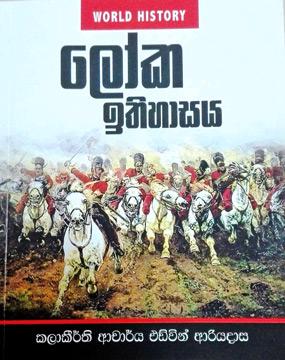
Loka Ithihasaya
Author: Kalakeerthi Dr Edwin Ariyadasa
M.D. Gunasena Publishers,
Colombo 11
Pages: 445
Price: Rs 1,500
In writing ‘Loka Ithihasaya’ Kalakeerthi Dr Edwin Ariyadasa goes down in history for his comprehensive book on the history of the world. He appears to have referred to all the available sources to bring out a highly readable book on the subject. There are many books on world history, but they are written mostly in English. The latest is perhaps Frank Welsh’s ‘The History of the World’. He has dealt with the long period from the dawn of humanity to the modern era. Dr Ariyadasa’s book on world history is unique because nobody else has written such a comprehensive book on the subject in Sinhala in recent times.
Anyone who attempts to write a book on world history would have to answer the basic question: Where should a history of the world begin? Strictly speaking, such a book should begin with the australopithecines – the southern great apes – who developed some skills in stone-working which helped their descendants move out of Africa, where we all began. However, to complete such an amorphous task would compel a historian to write several volumes. Scholars such as Frank Welsh and Dr Edwin Ariyadasa, intent on tidying up the messy hinterland of history, have arranged all the major historical events in neat sequences.
Dr Ariyadasa has compiled the book in his late 90s. That itself is a marvellous achievement. The book consists of nine chapters in a very commendable format.
The publishers have put out the book in an innovative way so that it can fit into your briefcase or travelling bag. They have understood the need of popularizing history among readers because even some lawmakers in the past had made derisive comments on the learning of history. Dr Ariyadasa has dealt with the old world, the Middle Ages, 15th century, 16th century, 17th century, 18th century, 19th century, 20th century and the modern age. In all these chapters he invariably records most of the important events relating to politics, war, peace, culture, empires, trade, industry, science, technology, and religion. The book is profusely illustrated with colour and black and white pictures of kings, emperors, philosophers, and scenes of battles.
Hunter-gatherers
History helps us understand our forebearers who started living as hunter – gatherers picking wild fruit or fishing. In the course of a long stretch of time they learnt how to ride horses, sail in boats, and how to face the vicissitudes of life with courage. Reading a book on history is more elevating than skimming through a work of fiction. History helps us to understand man’s struggles of living on a planet which provides ample opportunities to explore and experiment with everything under the sun.
Heraclitus’ aphorism “Everything is in a flux” applies even to history. It is in history that we learn how man changed during the past. If we do not know how man changed, we will not understand ourselves or our future. Today we are living in a world which is quite different from what we knew as children. It is true that mountains and rivers are still there as they were some centuries ago. Although we do not discern how mountains and rivers changed, today we see how man has changed. His behaviour, language, beliefs, culture, clothes, food and ambitions have undergone a sea change.
It is only in history that we learn about emperors such as Alexander the Great, Julius Caesar and Napoleon Bonaparte. History also holds the mirror to the clash of cultures, the rise and fall of empires, expansion of world religions such as Buddhism, Christianity, Hinduism, and Islam. How many of us are aware of the tide of events that swept through Western Europe in the 15th and 16th centuries? It was the period of the Renaissance, the Protestant Reformation and the Catholic Counter Revolution. There are lessons we can learn from the French Revolution and Napoleonic wars. All these events help us to understand the new world order. Without any knowledge of history we would be compelled to grope in the dark.
Third Millennium
Today we are heading for the Third Millennium. The World Wide Web is expanding. Terrorists attack powerful countries. There is also a communication revolution with Facebook, mobile phones, the Internet and numerous other highly sophisticated gadgets. All these have reduced the amorphous world into a tiny global village. What is undeniable is that humanity has coped with the sudden and enormous rise in population. In most countries children have a better chance of survival than their grandparents. The best hope for the future may lie in the acceptance of tolerant compromises.
In order to learn lessons from our forebearers we have to learn history. In schools only a fraction of history is taught for examinations. But how many students read history for their degrees? They ask: “What can you do with a degree in history?” But they have missed the point. We do not learn history to earn money. We learn history to become better human beings.
In most of the developed countries history is a compulsory subject. In the United States students are expected to know the country’s history. How many of our students study or read history? Against such a bleak background, Dr Ariyadasa’s book on world history would kindle an interest among the students and adults to learn the history of their country and the world.
If you have been looking for a book on world history in Sinhala, ‘Loka Ithihasaya’ is the ideal companion. I use the word ‘companion’ deliberately because the book has been produced in such a way that it can be carried anywhere you travel. In time to come Dr Ariyadasa’s book on world history will be a vade mecum.
